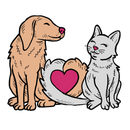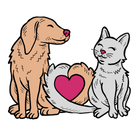FAQ's
Frequently Asked Questions
We recommend a straight switch to raw, there is no need to gradually introduce. Pick your day and make the switch to a totally healthy and natural diet.
However, if you wish to add raw in increasing amounts, while decreasing the old food over 3-5 days, that is fine too. There are no hard and fast rules here, so do what you feel is right for your dog and his or her needs. The most important thing is that you have chosen to make the switch, and whether you do right away or over a few days, you will be doing the best thing you could do for your doggo!
Please read this Switch to Raw guide for detailed information on how to switch.
Please click here for detailed info on Raw Feeding Puppies
You might also like to read our Switch to Raw Guide
A balanced and nutritious raw diet must include variety. You should be aiming to feed at least 5-6 different species i.e. lamb, beef, duck, chicken, pork, venison, turkey etc. over a 2-month period.
When feeding raw, variety is essential. Dogs will gain different levels of nutrients from different animals so the more variety the better.
We do not recommend mixing raw with kibble. When changing to a totally natural, healthy diet, we recommend feeding only raw.
By mixing, you are feeding a highly processed and un-healthy food with a totally natural and healthy diet. When mixing, you may not see all the benefits of raw feeding.
Dogs have the correct heads and dentition along with digestive systems to chew and digest bone very easily.
Chewing on bones offers a great source of mental and physical enrichment for your dog.
If you are really worried, You don't have to feed whole bones. You can feed raw minces that include bones.
Cooked bones should NEVER be given to dogs. Cooking dries bones out and makes them brittle. Raw bones are very different; they remain soft and are easily broken up by chewing.
Bone should be fed sparingly and should always be supervised.
Too much bone will cause constipation and could lead to impaction.
Most commonly referred to as hunger pukes, bilious vomiting during the night or early morning can cause concern. This is usually caused by fluid from the duodenum refluxing up into the stomach. This contains bile, which can cause irritation and nausea that triggers vomiting. The yellow, sometimes frothy bile is the most recognisable characteristic of hunger pukes.
Feeding dinner later in the evening, before bedtime, or feeding a snack before bedtime, usually resolves this. Feeding before bedtime, helps to keep the stomach full overnight. This in turn helps to prevent the build of fluid and bile that most often occurs in an empty stomach.
If your dog exhibits any signs of discomfort and/or symptoms that cause concern, please seek veterinary advice.
See this article onDalmatians and Raw Feeding

